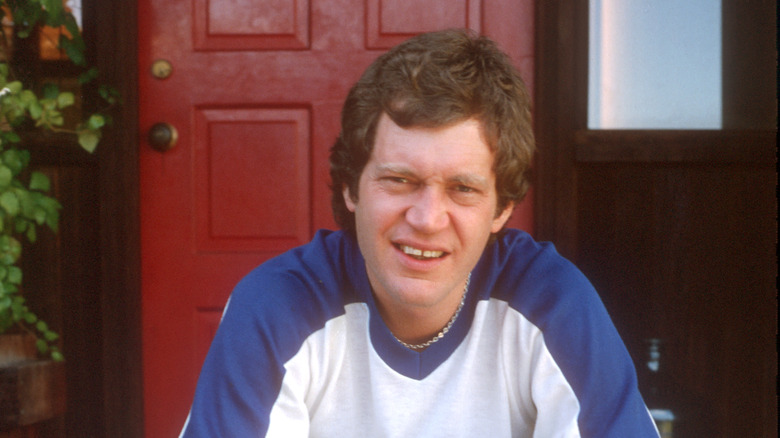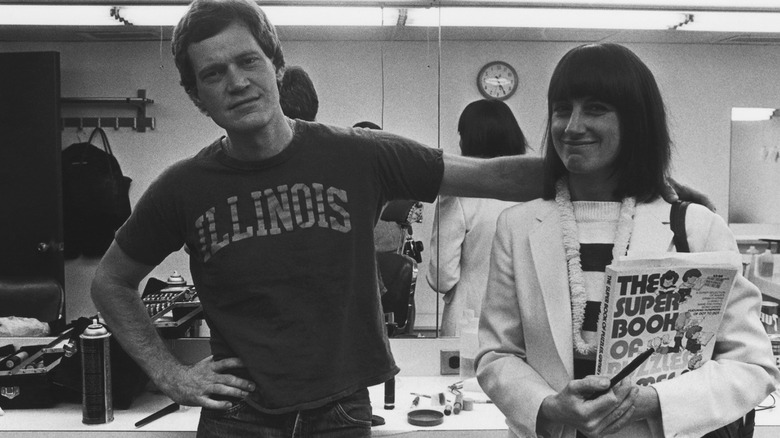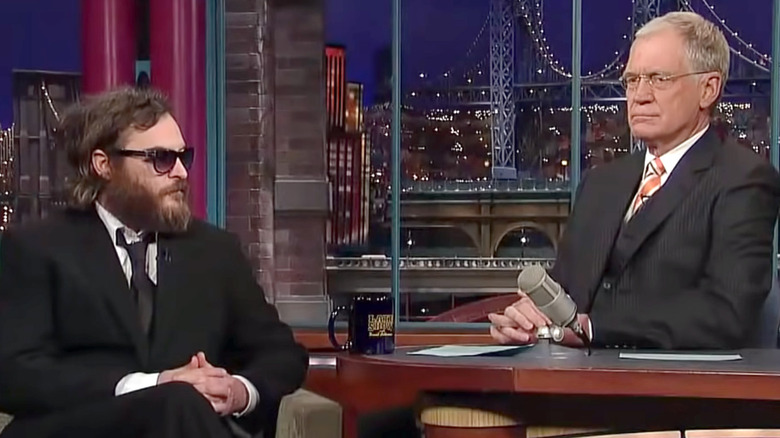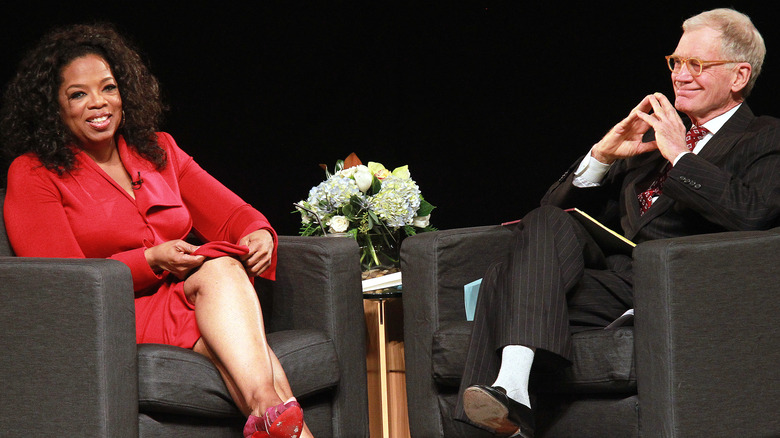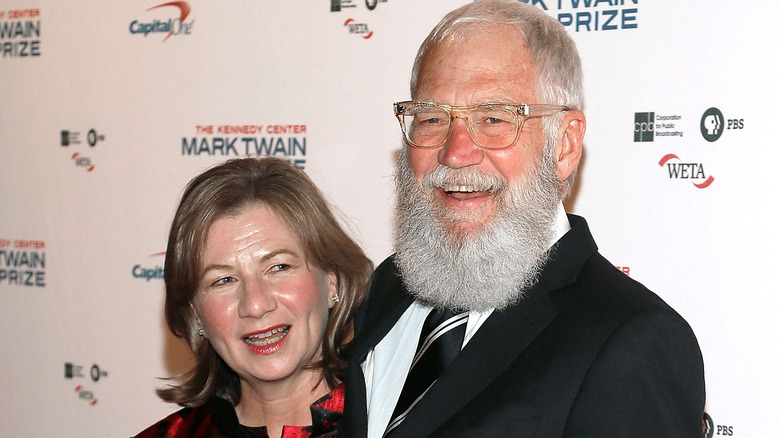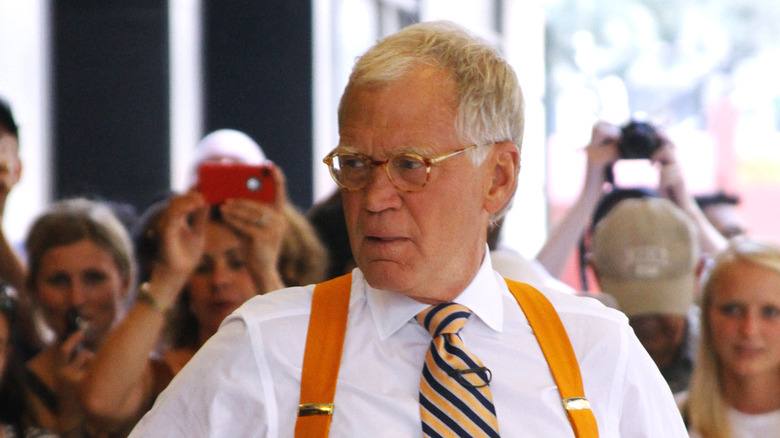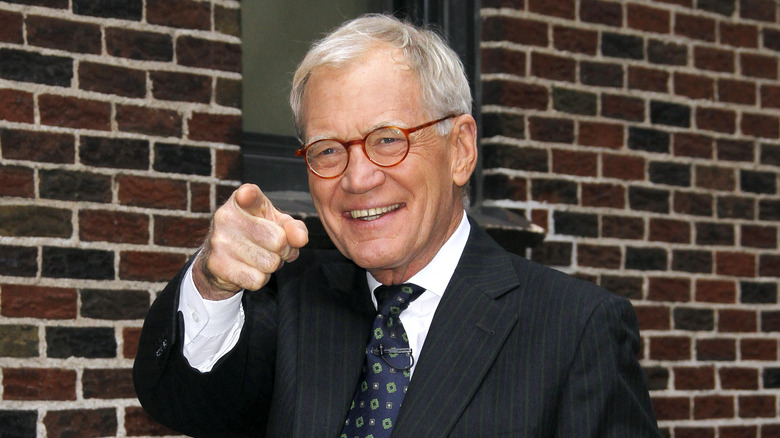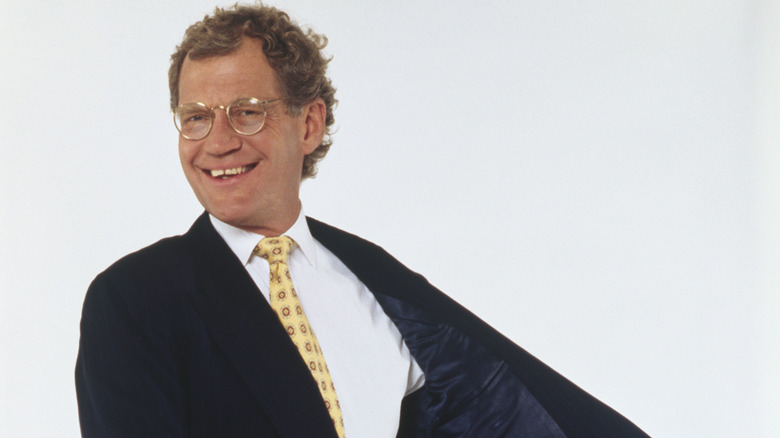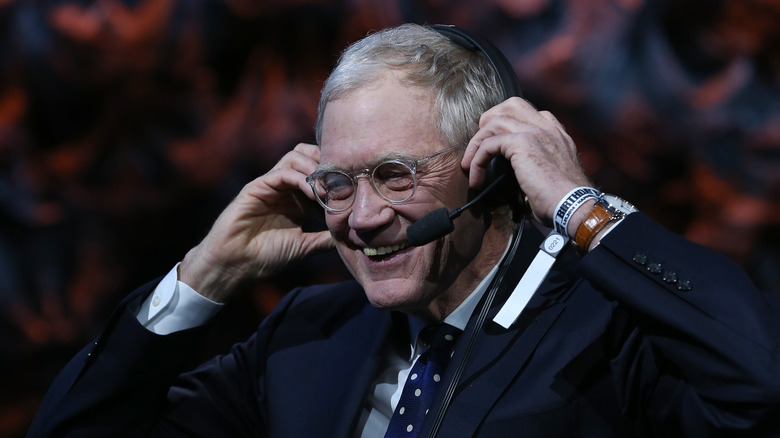The Shady Side Of David Letterman
Johnny Carson may be regarded as the king of late-night TV, but David Letterman will forever be known as the court jester who stole his crown. In doing so, the standup comic rewrote the manual on after-hours talk shows, turning them from corny, celebrity fawn fests into irreverent must-sees that regularly skewered contemporary culture.
It became irresistible to catch NBC's "Late Night with David Letterman" and later CBS' "The Late Show with David Letterman" to admire the subversive showman refusing to pander to celebrities peddling their wares. But it was equally delightful to see Letterman chinwag with folks who also loved to ruffle mainstream feathers, which is why the likes of late comedian Norm Macdonald and writer Fran Lebowitz were frequently asked back. Letterman's blend of edgy humor and controlled chaos is now legendary, spawning a legion of cheeky successors, from Jimmy Fallon to Conan O'Brien.
But behind the facade of his jocular genius lay a dark side. Letterman also became known for his controversial behavior, from haggling with producers and network executives to philandering with women on his staff and creating a culture of fear in the workplace. It's ironic that a star who made a habit of cutting self-important celebs down to size on set would fail to quarantine his own fragile ego behind closed doors. That's why it seems appropriate that a guy who drew viewers with such sideshows as the Top 10 List be given similar treatment when it comes to his behavior.
David Letterman was insubordinate since day one
According to Jason Zinoman, who chronicled David Letterman's life and career in his book "Letterman, The Last Giant of Late Night," the media star gravitated towards comedy as a child growing up in Indiana, listening to radio instead of TV, where he regularly heard comics like Jack Benny and sketch duo Bob and Ray.
During his post-secondary days in the rebellious 1960s, Letterman used those comedic influences to demonstrate his penchant for insubordination when he joined local college radio station WBST in Muncie, Indiana. Frequently, he'd abandon the station's classical music format, opting to spin pop records and deliver fake news on-air. "It was like hiring a fox to guard the chicken coop," said one colleague about Letterman, who was fired twice.
After graduation, Letterman landed a weekend weatherman spot on WLW-TV, where he would crack up viewers with lines like comparing hailstones to canned ham. But when the call went out for a full-time weatherman, Letterman was passed over and left his job. By this time, he was married to his first wife, Michelle Cook, and his decision to go into showbiz full-time proved to be a strain on their marriage after they moved to Los Angeles. The instability of life as an emerging stand-up comedian and Letterman's own insecurities not only resulted in the two divorcing in 1977, they also became the first of many black marks that would long taint his ego and personality.
He cheated on his girlfriend
Shortly after his divorce, Letterman met Merrill Markoe, a fellow standup on the comedy circuit, per "Letterman, The Last Giant of Late Night." At the time, Letterman's star was finally rising thanks largely to appearances on "The Tonight Show," while Markoe was getting her name around as a superlative joke writer.
By 1980, when NBC took a chance on Letterman to host what turned out to be a short-lived daytime show, he gave the head writer job to Markoe. Two years later, Markoe assumed the same post when NBC approached the comedian to helm "Late Night With David Letterman." While he could have been jubilant over a successful second chance, Markoe, who became Letterman's girlfriend by the time the evening show started, later said to Salon that "He ran the spectrum from mildly dissatisfied to very unhappy with most of what we did."
Letterman was constantly in fear of being canceled again, even though the show ran unchallenged in its timeslot for more than a decade. And despite being in a relationship, he also sought the company of other "Late Night" female staff. E! Online columnist Ted Casablanca theorized to ABC News that because Letterman wasn't married, he felt it was "OK to have sex with the women who work for you." One of them was with a woman named Regina Lasko, whom Letterman first dated in 1986 while still going out with Markoe. Two years later, Markoe split from Letterman, who eventually married Lasko in 2009.
The late-night host was frequently rude to guests
Since invading after-hours time slots, first with the ramshackle "Late Night With David Letterman in 1982 and the slicker CBS followup "The Late Show With David Letterman" 11 years later, one constant between the two shows has always been the host's awkward efforts to make his guests squirm.
Letterman's targets included a pre-Presidential Donald Trump, one time needling the billionaire on his personal worth. He pranked fitness guru Richard Simmons by telling him Barbra Streisand was on the program, only to reveal a show regular imitating the diva. "No one's ever been this cruel to me," remarked a forlorn Simmons afterward.
Contemptuous of guests who used his show to promote their projects, he went after Justin Bieber by grabbing the young singer's arm to show off what Letterman felt was a distasteful tattoo. He slowly roasted disheveled actor Joachin Phoenix by associating him with The Unabomber and dismissing the star's apparent decision to drop his craft in favor of a hip-hop direction. "I mean, he came out begging to be beat up," said Letterman to Vulture. "How can you not take a couple of swings?" Apparently, as long as the laughs kept coming after each antic, Letterman felt there was no line he couldn't cross.
David Letterman made female guests uncomfortable
Among the guests that David Letterman would humiliate, albeit with a polite demeanor, the men got off easy. Letterman was more brutal to female celebrities, sometimes inching into creepy, misogynist domain. He freaked out Jennifer Aniston when his pearly whites chomped on her tresses, caught Taylor Swift off-guard when he declared she smelled like "expensive wood," and left a normally detached Paris Hilton shaking after pressing her about being in jail.
All that on-air boorishness prompted a few spirited women to take him on. Once Madonna settled herself in the guest chair, she called Letterman "a sick f***" before dropping a succession of f-bombs throughout her segment. Not to be outdone, an outspoken Cher called him "an a**hole" for how she thought he mistreated some guests. But perhaps his most infamous clash occurred with Oprah Winfrey, originating at a "Late Show" taping in Chicago, where members of the audience heckled her. "It was a terrible experience for me," she'd later tell Letterman, settling a feud between the two that lasted for two decades.
While Letterman never specifically addressed his treatment of female guests, he believed his antagonism was jocular fodder for the show. "Many times, the laugh would come at the expense of the guest," he told Vulture. "I regret that now, but at the time you think, I've got to do anything to keep my head above water."
He cheated on his second wife
Even after marrying Lasko, Letterman still couldn't resist having affairs with female members of his staff. In 1990, one love interest was Stephanie Birkitt, who was also the girlfriend of Joe Halderman, a CBS News producer. When Halderman found out about the affair, he tried to extort Letterman for $2 million, but Letterman and his lawyer informed authorities about the plot and the blackmailer was arrested, per CNN.
"I have had sex with women who work on the show," admitted Letterman to his audience, while still managing to get a laugh out of the scandal. "Would it be embarrassing if it were made public? Perhaps it would ... especially for the women." One group that didn't find the situation humorous was the National Organization for Women, which blamed Letterman for creating a toxic work environment and called on CBS to fix it. "The latest Letterman controversy sheds new light on the widespread objectification of women in the workplace," said NOW in a statement.
It wasn't likely that a media release by a feminist organization was top of mind for Letterman a few days after the extortion bombshell. More immediate matters concerned his family and colleagues, and to that end, he issued an apology on his show. Admitting his philandering severely hurt his wife, Letterman, almost in tears, didn't get many laughs when he concluded his spiel with "Let me tell you folks, I got my work cut out for me."
David Letterman hired mostly male writers
While David Letterman hung onto his job at CBS and worked on his strained marriage, the fallout from the infidelity-fueled blackmail scandal was far from over. Former writer Nell Scovell created a shockwave with a Vanity Fair piece claiming that Letterman fostered a decidedly female-unfriendly work environment.
While devoid of specifics, Scovell's list of issues was extensive. Back in 1990 and even while hunkered in an isolated room with other writers (all male), she was still aware of Letterman and senior male staff's philandering. And women on the receiving end benefited from promotions while lording their influence over other workers. Scovell said she was never involved in any of those situations, but the toxicity was enough for her to leave her job after a few months and stay silent until the scandal compelled her to write her column. "I'd seen enough to know that I was not going to thrive professionally in that workplace," Scovell wrote. "And although there were various reasons for that, sexual politics did play a major part."
In a follow-up Vanity Fair piece she wrote 10 years later, Scovell interviewed Letterman about his behavior a decade earlier and his contribution to the socially corrupt workplace conditions. "I felt horrible because who wants to be the guy that makes people unhappy to work where they're working?" responded Letterman during the interview. "I don't want to be that guy. I'm not that guy now. I was that guy then."
The TV icon constantly berated his team
David Letterman's philandering aside, he also directed his toxicity at the rest of his staff. If a comedic bit he dispensed to his live audience didn't go over well, he constantly berated the very folks hired to make him appear funny on the small screen. Author Jason Zinoman documented several accounts of Letterman arguing with producers and lashing out at writers, who knew better than to verbally strike back. Some of them developed bizarre nuances, including one nervous writer who wound up chewing pieces of metal from soda cans (via New York Daily News).
"Late Night" head writer and Letterman's ex-girlfriend Merrill Markoe believed the root of his antics went back to 1980, when NBC canceled his daytime show after a short run. "Because it was canceled after a few months, the experience was very traumatic and long-lasting for its host," said Markoe to Salon. "From that point on, he was extremely anxiety-ridden about being canceled again."
Zinoman thinks that another source of his insecurity extends back to his Indiana days, with the divorce of his parents, followed by his father's fatal heart attack. "I just felt like he never quite got to do what he wanted to do," said Letterman about his father in Zinoman's biography. "I really wanted to make good on my personal commitment, because I know it was probably the same as my father's personal commitment, but he just never had the opportunity or the pathway to fulfill it."
He sometimes got out of control
While he could be brash and insulting, David Letterman was skillful enough to get a laugh out of his antics, but occasionally, he went off the rails. During one episode, he swore at outspoken comic book artist Harvey Pekar. Another episode saw him walk off the set when actor Crispin Glover was getting too edgy for his liking.
But the biggest moment, one that never made it to air, was when he beat the daylights out of a life-size doll replica of himself in a gag concocted in 1995. Letterman generated a few laughs when he punched at the prop in the guest chair. But then he went ballistic on the doll with the fury of a UFC contender. It was as if Letterman unleashed all that angst and anger during that moment.
Jason Zinoman, who chronicled that blow-by-blow event in his biography of Letterman (per New York Daily News) traced the meltdown to the time when the host lost a bid against rival personality Jay Leno to succeed retiring "Tonight Show" host Johnny Carson earlier that year. In anger, Letterman left "Late Night" and NBC (which also ran "The Tonight Show") for CBS to begin his 22-year tenure on "The Late Show." For months, ratings between Letterman and Leno were neck and neck, until Leno's infamous interview with Hugh Grant left "Late Night" in the dust. Obviously, Letterman didn't take those results gracefully.
David Letterman alienated himself from staff
To the outside world, David Letterman was dorky-chic with a lanky frame, a gap-toothed grin, and a self-effacing sense of humor that could turn into subversiveness on a dime for the sake of entertainment. But beneath that oddball, albeit endearing, exterior lurked an insecure comedian whose paranoia gradually sequestered himself from the rest of the "Late Night" folks. New York Magazine, which frequently reported on Letterman's rudeness to colleagues and guests alike while he carried on infidelities with female staff, uncovered a more surreptitious side of the talk show host who wound up alienating everyone except a few select insiders.
At first, he fraternized with everyone from producers to pages, even playing a few softball games with them after work. But over time, his presence outside his office became rare. "He and his assistants are literally walled off from the rest of the staff, behind a glass door," said one anonymous former worker. "There is just no contact." The source added that it didn't take long for the rest of the workforce to also become paranoid about the fate of their jobs and even the show.
For his part, Letterman seemed oblivious to what went on outside his closed door, especially among his writers. "I don't know about my writers' room," said Letterman in a Vulture interview. "I never went to the writers' room, so I have no idea what went on there. I stayed away: 'Just call me when you're done.'"
The talk show host took shots at his bosses
David Letterman's loss to Jay Leno in the Johnny Carson succession war remained a bitter pill to swallow for several years. While he seldom commented on the incident, the defeat continued to eat away at him internally, adding to his misery behind the scenes at his own show. Vindictive over the thought that NBC made the wrong choice, Letterman frequently took shots at the network's entertainment president Warren Littlefield, at one point calling him "the short kid with the beard," per Variety.
He was even more caustic towards NBC West Coast President Don Ohlmeyer, who was also in on the Leno decision. "He fancies himself [as] creative," said Letterman about the executive years later. "Here's a guy who could not create gas after a bean dinner." Years after the debacle, Littlefield said that NBC passed over Letterman when his agent said his client wanted control over the entire show and that it wasn't going to be cheap. "They put our backs to the wall," recalled the former network head on CNN's "The Story of Late Night" docuseries.
Letterman admitted he was still angry after moving to CBS. When Leno pulverized him in the ratings, Letterman recalled having extensive arguments with CBS President Les Moonves. "And then I gradually began to realize that the problem was me, and I made my peace with that," Letterman said at a New Yorker Festival conference in 2016, as reported by Deadline. "It was simply that a larger number of people liked watching Jay Leno more than they liked watching me."


